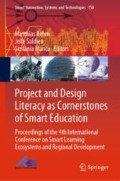Abstract
Technological innovation has changed the relationship between formal, non-formal, and informal learning leading to rethink the definition of learning context: Activity Theory can help create a model integrating formal and formal learning through collaborative knowledge building involving schools and professionals/employers. Interaction between these two “activity systems” generates “boundary objects” that can be useful in both the educational setting and the workplace. This process can provide students with meaningful situated learning experiences that boost their motivation and interest, just because they are based on real-world problems that students will face in their future jobs.
Access this chapter
Tax calculation will be finalised at checkout
Purchases are for personal use only
References
Hämäläinen, R., De Wever, B., Malin, A., Cincinnato, S.: Education and working life: VET adults’ problem-solving skills in technology-rich environments. Comput. Educ. 88, 38–47 (2015)
Noble, C., Billett, S.: Learning to prescribe through coworking: junior doctors, pharmacists and consultants. Med. Educ. 51(4), 442–451 (2017)
Jonassen, D.H.: Meaningful learning with technology. Prentice (2008)
Brown, A.L., Campione, J.C.: Psychological theory and the design of innovative learning environments: on procedures, principles, and systems. In: Schauble, L., Glaser, R. (eds.) Innovations in Learning: New Environments For Education, pp. 289–325. Lawrence Erlbaum Associates, Mahwah, NJ (1996)
Hattie, J.A.: Visible Learning: A Synthesis of Over 800 Meta-Analyses Relating To Achievement. Routledge, Abingdon (2009)
Tamim, R.M., Bernard, R.M., Borokhovski, E., Abrami, P.C., Schmid, R.F.: What forty years of research says about the impact of technology on learning: a second-order meta-analysis and validation study. Rev. Edu. Res. 81(1), 4–28 (2011)
Higgins, S., Xiao, Z., Katsipataki, M.: The Impact of Digital Technology On Learning: A Summary for the Education Endowment Foundation. School of Education, Durham University (2012). http://educationendowmentfoundation.org.uk/uploads/pdf/The_Impact_of_Digital_Technologies_on_Learning_(2012).pdf
Engeström, Y.: Expansive learning: Towards an activity-theoretical reconceptualization. In Contemporary Theories of Learning, pp. 46–65. Routledge (2018)
Kaptelinin, V., Nardi, B.A.: Acting with Technology: Activity Theory and Interaction Design. MIT press (2006)
Seel, M.N., Winn, W.D.: Research on media and learning: distributed cognition and semiotics. Theory, Res., Model. Instr. Des.: Int. Perspect. 1, 32–293 (2012)
Nonaka, I., Takekeuchi, H.: The Knowledge-Creating Company. Oxford University Press, New York (1995)
Bereiter, C., Scardamalia, M.: Education for the knowledge age: design-centered models of teaching and instruction. In: Alexander, P.A., Winne, P.H. (eds.) Handbook of Educational Psychology, pp. 695–713. Lawrence Erlbaum Associates Publishers, Mahwah, NJ, US (2006)
Engeström, Y., Miettinen, R., Punamäki, R.L. (eds.): Perspectives On Activity Theory. Cambridge University Press (1999)
Kuutti, K.: Activity theory as a potential framework for human–computer interaction research. In Nardi, B.A. (ed.) Context and Consciousness: Activity Theory and Human–Computer Interaction, pp. 17–44 (1996)
Barab, S., Schatz, S., Scheckler, R.: Using activity theory to conceptualize online community and using online community to conceptualize activity theory. Mind Cult. Act. 11(1), 25–47 (2004)
Ballarino, G.: Istruzione, formazione professionale, transizione scuola-lavoro. Il caso italiano in prospettiva comparata, Rapporto di ricerca IRPET (2013)
Gentili, C.: Istruzione tecnica tra sapere e cultura d’impresa. FORMAZIONE and INSEGNAMENTO 10(2), 141–164 (2014)
Brown, P., Green, A., Lauder, H.: High skills: globalization, competitiveness, and skill formation: globalization, competitiveness, and skill formation. OUP Oxford (2001)
Alam, S.L., McLoughlin, C.: Using digital tools to connect learners: present and future scenarios for citizenship 2.0. In Steel C.H. et al. Curric. Technol. Transform. Unkn. Future. Proc. Ascilite (2010)
Bell, S.: Project-based learning for the 21st century: skills for the future. Clear. House 83(2), 39–43 (2010)
De Bruijn, E., Leeman, Y.: Authentic and self-directed learning in vocational education: challenges to vocational educators. Teach. Teach. Educ. 27(4), 694–702 (2011)
Taddeo, G.: Scuola per il lavoro Industry 4.0, così gli ITS innovano la didattica con le tecnologie, Agenda Digitale (2018). https://www.agendadigitale.eu/scuola-digitale/scuola-per-il-lavoro-industry-4-0-cosi-gli-its-innovano-la-didattica-con-le-tecnologie/
Bergmann, J., Sams, A.: Flip Your Classroom: Reach Every Student In Every Class Every Day. International Society For Technology In Education. International Society for Technology in Education, Washington DC (2012)
Bishop, J.L., Verleger, M.A.: The flipped classroom: a survey of the research. In ASEE National Conference Proceedings, Atlanta, GA (vol. 30, no. 9, pp. 1–18) (2013, June)
Sun, D., Looi, C.K.: Boundary interaction: Towards developing a mobile technology-enabled science curriculum to integrate learning in the informal spaces. Br. J. Edu. Technol. 49(3), 505–515 (2018)
Dabbagh, N., Kitsantas, A.: Personal Learning Environments, social media, and self-regulated learning: a natural formula for connecting formal and informal learning. Internet High. Educ. 15(1), 3–8 (2012)
Zitter, I., Hoeve, A., de Bruijn, E.: A design perspective on the school-work boundary: a hybrid curriculum model. Vocat. Learn. 9(1), 111–131 (2016)
Jenkins, H., Ito, M.: Participatory Culture In A Networked Era: A Conversation On Youth, Learning, Commerce, and Politics. Wiley (2015)
Collins, A., Greeno, J.G: Situative view of learning. In Aukrust, V.G. (ed.) Learning and Cognition, pp. 64–68. Elsevier Science (2011)
Collins, A., Brown, J.S., Newman, S.E.: Cognitive apprenticeship: teaching the crafts of reading, writing, and mathematics. In: Resnick, L.B. (ed.) Knowing, Learning and Instruction. Essays In Honor of Robert Glaser, pp. 453–495. Lawrence Erlbaum Associates, Hillsdale, NJ (1989)
Caridade, C.M.R., et al.: CAS and real life problems to learn basic concepts in Linear Algebra course. Comput. Appl. Eng. Edu. 23, 567 (2015)
Mulgan, G., Townsley, O., Price, A.: The challenge-driven university: how real-life problems can fuel learning. NESTA (2016)
Author information
Authors and Affiliations
Corresponding author
Editor information
Editors and Affiliations
Rights and permissions
Copyright information
© 2020 Springer Nature Singapore Pte Ltd.
About this paper
Cite this paper
Petrucco, C. (2020). Meaningful Learning by Creating Technology-Mediated Knowledge Boundary Objects Between School and the Workplace. In: Rehm, M., Saldien, J., Manca, S. (eds) Project and Design Literacy as Cornerstones of Smart Education. Smart Innovation, Systems and Technologies, vol 158. Springer, Singapore. https://doi.org/10.1007/978-981-13-9652-6_17
Download citation
DOI: https://doi.org/10.1007/978-981-13-9652-6_17
Published:
Publisher Name: Springer, Singapore
Print ISBN: 978-981-13-9651-9
Online ISBN: 978-981-13-9652-6
eBook Packages: Intelligent Technologies and RoboticsIntelligent Technologies and Robotics (R0)

